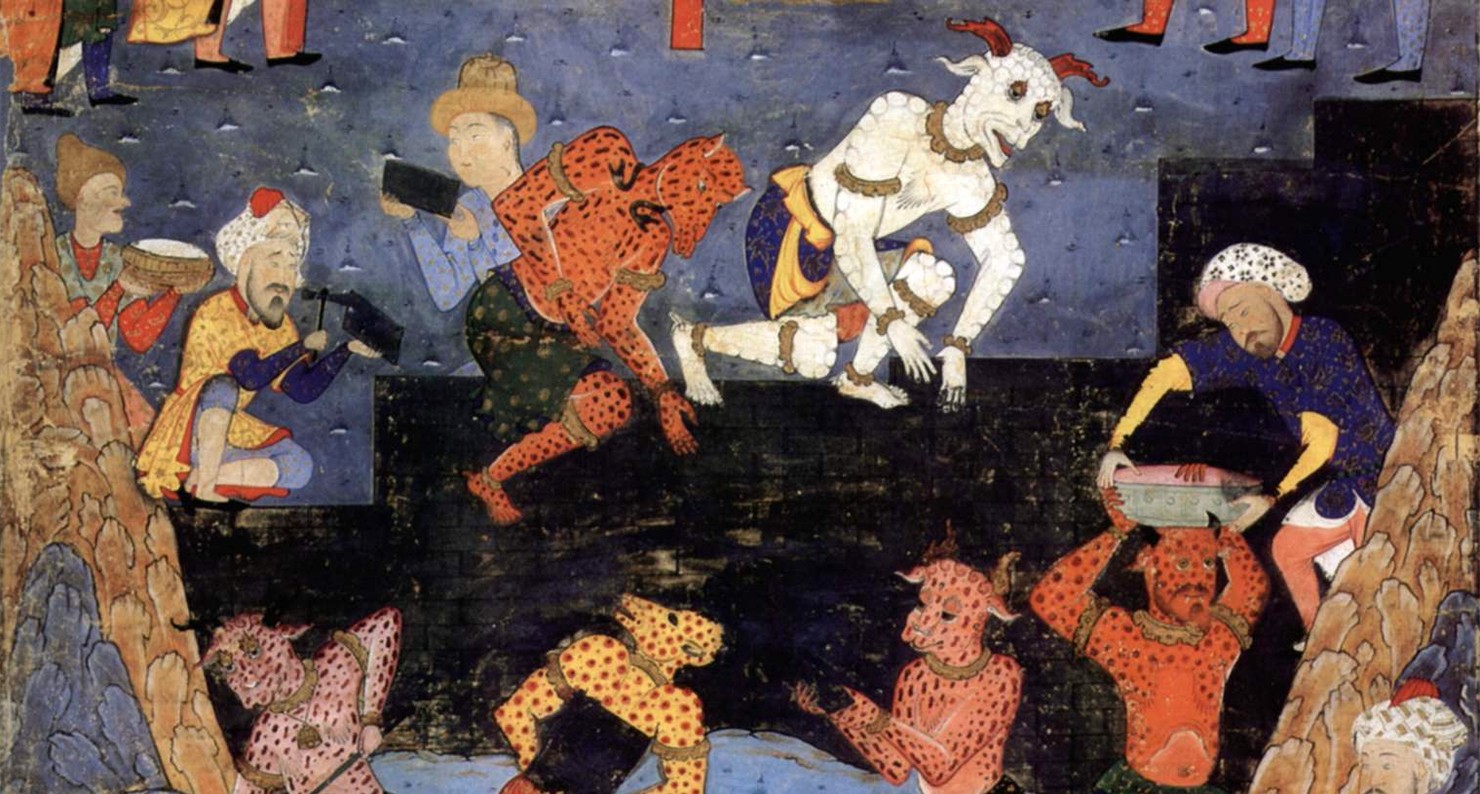Dhul-Qarnayn (Arabic: ذو القرنين ḏū’l-qarnayn), “he of the two horns” (or “he of the two ages”), appears in the Quran as a figure empowered by God to erect a wall between mankind and Gog and Magog, the representation of chaos. Dhul-Qarnayn is generally described as a righteous ruler who travelled to spread the message of God. Of interest is this verse from Qur’an, 18:86 which has recently raised much ruckus among the enemies of Islam.
The following English translation was taken from A. Yusuf Ali:
“Until, when he reached the setting of the sun, he found it set in a spring of murky water: Near it, he found a People: We said: “O Dhul-Qarnayn! (thou hast authority) either to punish them, or to treat them with kindness.” (Qur’an, 18:86)
A common Christian missionary “objection” to the verse above is by claiming it to be a “scientific contradiction”.
-
If the presence of scientific facts can prove the Qur’an’s divine origins, the presence of scientific falsehood can disprove divine origins. For example, Sura’ 18:86:
“Until, when he reached the setting of the sun, he found it set in a spring of murky water: Near it he found a People: We said: “O Dhul-Qarnayn! (thou hast authority,) either to punish them or to treat them with kindness.”
Since we all know that the sun does not set in a spring of murky water and, therefore, this is a big error. However, Muslim apologists are quick to tell us that this is only poetic and not a “scientific miracle”! This type of apologetic is intellectually dishonest as well as a bit silly.
So who is the one that is actually “intellectually dishonest as well as a bit silly”? Let us analyse the verse part by part.
[toc]
Analysis Of The Verse
“Until, when he reached the setting of the sun…”: The translation of this part of the verse does not say that Dhul-Qarnayn reached the place where the sun sets literally, rather it means here that Dhul-Qarnayn was facing the direction in which the sun is setting. The “setting of the sun,” is an Arabic idiom meaning ‘the western-most point’ of his expedition. However, in general, idioms should not be literally translated.
“…he found it set in a spring of murky water”: The Qur’an is obviously describing what Dhul-Qarnayn saw. What Dhul-Qarnayn saw was the image of the sun setting in a dark body of water. Since the Qur’an is clearly describing this from Dhul-Qarnain’s direct point of view (the Qur’an is quite explicit here in doing that), there is, in fact, no problem with the description of what Dhul-Qarnain saw. Of course, one is correct in saying that “the sun does not set in a spring of murky water”, but try standing at a beach during the time when the sun is about to set and anyone would be able to see the sun “entering” the sea far in the horizon. This, therefore, gives us the conclusion that Dhul-Qarnayn was somewhere west and by a large body of water, possibly the sea.
Critics of this verse should be aware that the Qur’an is not descriptive prose, and the words of the Qur’an is of high poetical eloquence, something which the Bible is not able to claim. Since the beauty of the Qur’an is in its poetical nature, it is therefore only natural that the Qur’an uses emphatic expressions to describe something like a “sunset”.
Keep in mind that the Qur’an is in poetical prose and is meant to be a challenge to the pagan Arabs in Mecca who prided themselves as writers of good poetry. Those neophytes who like to use this verse as a stick to beat Islam with should attempt to study Arabic literature and the history of that period before coming up with silly conclusions.
Therefore, it is clear the verse says that Dhul-Qarnain went west and saw the sun setting over the horizon so that it looked to him as though it was setting into the sea, which is murky-looking. Probably the critic has never stood by on the beach and observe the sunset.
For further clarification of our explanation, we reproduce two other translations of the same verse by M. M. Pickthall and Shakir.
Translation by M. M. Pickthall
Till, when he reached the setting-place of the sun, he found it setting in a muddy spring, and found a people thereabout. We said: O Dhu’l-Qarneyn! Either punish or show them kindness. (Qur’an 18:86)
Translation by Shakir
Until when he reached the place where the sun set, he found it going down into a black sea, and found by it a people. We said: ‘O Zulqarnain! either give them a chastisement or do them a benefit.’ (Qur’an 18:86)
We can see that the general agreement of the translations of this verse is that Dhul-Qarnain saw the sun setting into the horizon that it looks like it is set into a body of water (sea) that looks murky-looking. That this verse was never taken literally was not alien in the understanding of the early commentators.
How The Early Commentators Understood The Verse
In his famous commentary known as Al-Game’ le Ahkam-el-Qur’an, Imam Al-Qurtubi (died 671 AH/1273 CE) wrote about this verse:
It is not meant by reaching the rising or setting of the sun that he reached its body and touched it because it runs in the sky around the earth without touching it and it is too great to enter any spring on earth. It is so much larger than earth. But it is meant that he reached the end of populated land east and west, so he found it – according to his vision – setting in a spring of murky water as we watch it in smooth land as if it enters inside the land. That is why He said, “he found it rising on a people for whom we had provided no covering protection against the sun.” (Holy Qur’an 18:90) and did not mean that it touches or adheres to them, but they are the first to rise on. Probably this spring is a part of the sea and the sun sets behind, with or at it, so the proposition takes the place of an adjective and God knows best.
Al-Qurtubi, Al-Game’ le Ahkam-el-Qur’an, Vol. 16 (Dar-ul-Hadith, Cairo, Egypt), p. 47
Fakhr-ud-Deen Ar-Razi wrote in his commentary on the same verse that:
When Zul-Qarnain reached the furthest west and no populated land was left, he found the sun as if it sets in a dark spring, but it is not in reality. The same when sea traveller sees the sun as if it sets in the sea if he cannot see the shore while in reality, it sets behind the sea.
Fakhr-ud-Deen Ar-Razi, At-Tafsir-ul-Kabeer, Vol. 21, p. 166
Ibn Kathir (701-774 AH/1302-1373 CE) wrote in his commentary about this verse that:
“Until, when he reached the setting of the sun” means he followed a certain way until he reached the furthest land he could go from the west. As for reaching the setting of the sun in the sky, it is impossible. What narrators and storytellers say that he walked for a period of time in earth while the sun was setting behind him is unreal, and most of it is from myths of People of the Book and inventions of their liars. “he found it set in a spring of murky water” means he saw the sun according to his vision set in the ocean and this is the same with everyone ending to the shore seeing as if the sun sets inside it (i.e. the ocean).
Tafsir-ul-Qur’an Al-‘Azeem by Ibn Kathir, Vol. 5, p. 120
According to Al-Mawardi (d. 450 A.H) in his tafsir, the verse can be understood as:
That He (Dhul Qarnayn) wajadaha (found it, saw it) setting behind the spring (‘ayn) as if it was setting in the very spring.”
Al-Mawardi, ‘Ali bin Muhammad bin Habib, Al-Nukat wa al-‘Uyun, Vol. 3 (Dar al-Kutub al-‘Ilmiyya), p. 450
And finally, to strengthen our observation that the part of the verse above is indeed poetical in nature and that the Qur’an had never meant the statement to be understood literally or from a “scientific” perspective, let us now see a picture of the sun setting in the horizon.

Conclusions
The allegation put forth against the Qur’an is utterly baseless and is refuted by the Arabic language itself. The verse contains no reference at all to the sun literally setting, or entering, or going down, into a muddy pool of water. It is clear to us that the above-mentioned verse is only considered “unscientific” if we would also consider that similar emphatically-used phrases such as “Japan, the land of the rising sun” or “Sabah, the land below the wind” to be “unscientific” as well.
Our advice to those neophytes is that before they try to find any more “discrepancies” in the Qur’an they should consider the following discrepancy of the Bible to clarify which Book actually has a severe defect:
And the hare, because he cheweth the cud, but divideth not the hoof; he is unclean unto you. (Leviticus 11:6)
Now we all know that the hare (or anything related to rabbits) do not chew cud. Is this a “poetical” expression of the Bible? And only God knows best. 


Leave a Reply to Aijaz Cancel reply